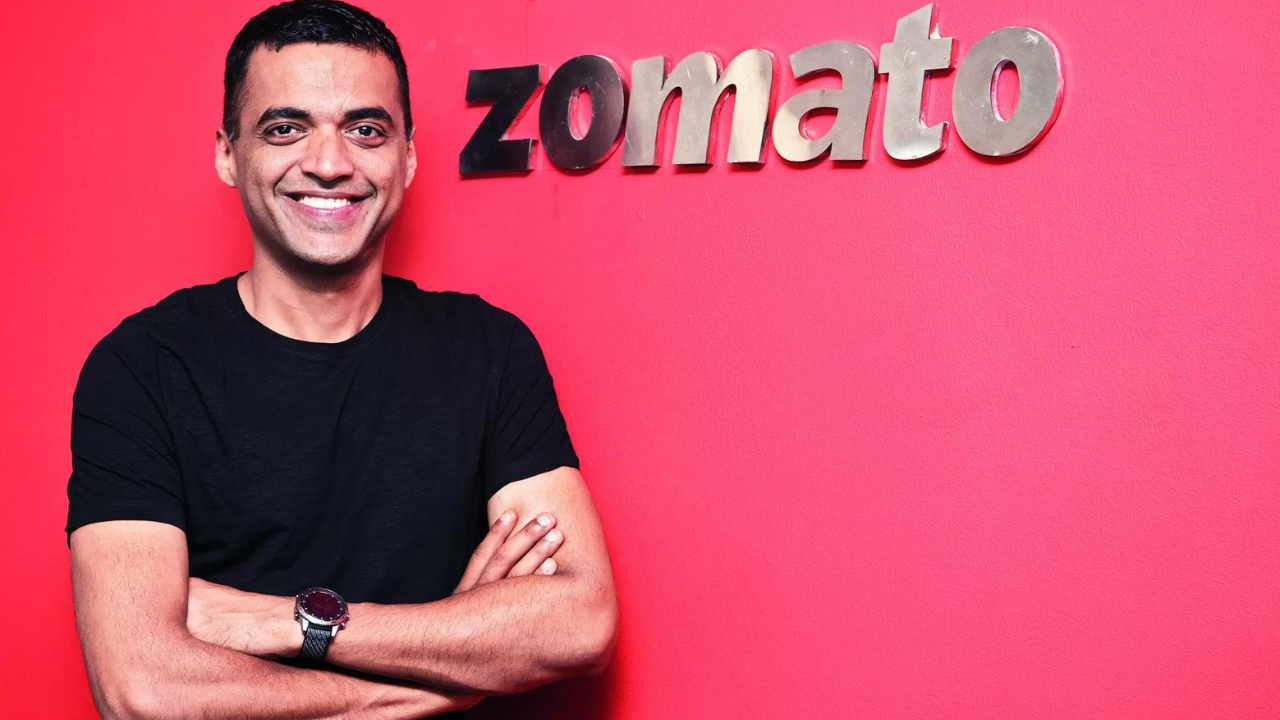A Detailed Analysis Of Zomato India’s One Of The Most Successful Unicorn in 2024: Past, Present & Future

How It Started
Zomato, one of India’s leading food delivery and restaurant discovery platforms, has an intriguing origin story. The company was founded in 2008 by Deepinder Goyal and Pankaj Chaddah, both of whom were alumni of the Indian Institute of Technology (IIT) Delhi. The inspiration for it came from their experiences working at Bain & Company, where they noticed a recurring problem: employees spent too much time searching for menu cards and ordering food.
Initially named “Foodiebay,” the platform started as an online directory of restaurant menus in Delhi NCR. The founders scanned and uploaded menus from various restaurants, allowing users to browse and decide where to order food. The convenience and utility of the service quickly gained traction, and the platform expanded to other cities in India.
In 2010, the company rebranded to Zomato, a name that was easier to remember and more suitable for a global audience. Over the years, it has diversified its offerings, moving beyond a simple menu listing service to include restaurant reviews, table reservations, and online food delivery. The company also expanded internationally, entering markets in the Middle East, Southeast Asia, and beyond.
Its growth was fueled by several rounds of funding from prominent investors, allowing it to enhance its technology and logistics infrastructure. Today, it stands as a testament to how a simple idea, born out of a common workplace frustration, can evolve into a global enterprise serving millions of customers.
List Of Founders & Cofounders, their share-holding and their profiles.
Zomato, founded in 2008 by Deepinder Goyal and Pankaj Chaddah.
It is one of India’s prominent unicorn startups in the food delivery and restaurant discovery space.

Deepinder Goyal is the CEO and co-founder of Zomato. He holds a Bachelor’s degree in Mathematics and Computing from the Indian Institute of Technology, Delhi (IIT Delhi). Before founding it, he worked as a management consultant at Bain & Company. Goyal is known for his strategic vision and leadership, driving it to expand its services globally.
Pankaj Chaddah, the other co-founder, played a crucial role in the early stages of Zomato. He also graduated from IIT Delhi with a degree in Mechanical Engineering. Chaddah was instrumental in establishing the company’s initial product and market presence. He left it in 2018 to pursue other entrepreneurial ventures.
As of the latest available data, Deepinder Goyal holds approximately 4.7% of it ‘s shares. Pankaj Chaddah’s shareholding reduced significantly after his departure, though exact figures vary based on subsequent funding rounds and stock sales.
Zomato has grown through multiple funding rounds, with significant investments from entities like Info Edge, Ant Financial, and Temasek Holdings. The company went public in 2021, listing on the Bombay Stock Exchange (BSE) and the National Stock Exchange (NSE) of India, marking a significant milestone in its journey.
List of Funding Rounds

Zomato, a prominent Indian food delivery and restaurant discovery platform, has experienced numerous funding rounds since its inception. The company was founded in 2008 by Deepinder Goyal and Pankaj Chaddah. It has raised significant capital to fuel its expansion and operations, attracting investments from various high-profile investors.
- Seed Funding (2010): It raised its first round of seed funding from Info Edge (India) Ltd, which invested $1 million.
- Series A (2011): It secured $3.5 million from Info Edge again, which helped the company expand its reach within India.
- Series B (2013): Info Edge continued its support by investing an additional $10 million. This round was pivotal for its initial international expansion.
- Series C (2014): It raised $37 million from Sequoia Capital and Info Edge, which was used to acquire various international competitors and enhance its technology.
- Series D (2015): The company secured $50 million from Info Edge, Vy Capital, and Sequoia Capital. This funding round bolstered its global footprint and diversified its services.
- Series E (2015): It raised $60 million from Temasek Holdings and Vy Capital, focusing on enhancing user experience and operational efficiency.
- Series F (2018): The company secured $200 million from Ant Financial, a subsidiary of Alibaba, marking a significant partnership aimed at expanding its digital payment solutions.
- Series G (2020): It raised $150 million from Ant Financial at a valuation of $3 billion, further strengthening its financial position.
- Pre-IPO (2021): Ahead of its IPO, It raised $250 million from investors like Kora Management, Fidelity, and Tiger Global Management.
- IPO (2021): It’s Initial Public Offering was highly successful, raising $1.3 billion, which was used to enhance its delivery network, expand into new markets, and explore new business verticals.
These funding rounds have played a crucial role in it’s growth, enabling it to become a leading player in the global food delivery market.
Total List Of Investors
Zomato, one of India’s leading food delivery and restaurant discovery platforms, has attracted a diverse group of investors over the years. Some of the notable investors in it include:
- Info Edge (India) Ltd: The first institutional investor, Info Edge has been a significant backer since 2010, holding a substantial stake in the company.
- Sequoia Capital: This prominent venture capital firm has been a key investor in Zomato, participating in multiple funding rounds.
- Vy Capital: An international investment firm, Vy Capital has also contributed significantly to it’s growth.
- Temasek Holdings: The Singaporean sovereign wealth fund has invested in it, showcasing confidence in the company’s potential.
- Ant Financial (a subsidiary of Alibaba Group): This Chinese fintech giant invested in Zomato, further boosting its valuation and growth prospects.
- TIGER Global Management: Known for its investments in high-growth tech companies, Tiger Global has also invested in it.
- Fidelity Management and Research Company: This American multinational financial services corporation participated in it’s funding rounds, adding to the company’s capital pool.
- Baidu: The Chinese multinational technology company also invested in Zomato, expanding its international investor base.
- Pacific Horizon Investment Trust: Managed by Baillie Gifford, this investment trust has invested in Zomato, reflecting strong institutional interest.
- Kora Management: This global investment firm participated in it’s funding rounds, supporting its expansion efforts.
These investors have played crucial roles in it’s journey, providing the financial backing needed to scale its operations and enhance its market presence globally.
Valuation As Of June 2024
As of June 2024, Zomato’s valuation stands at approximately $9.5 billion. The company, founded by Deepinder Goyal and Pankaj Chaddah in 2008, has evolved from a restaurant discovery platform to a comprehensive food delivery and dining services giant. It’s valuation has seen significant fluctuations due to market dynamics, regulatory challenges, and competition from other food delivery giants like Swiggy and international players.
Zomato’s valuation is bolstered by its continuous expansion into new markets and verticals, including grocery delivery and cloud kitchens. The company has also invested in cutting-edge technology, enhancing user experience and operational efficiency. Strategic partnerships and acquisitions have further strengthened its market position.
In 2024, Zomato’s financial health reflects a mix of growth and consolidation. While the company has achieved impressive revenue milestones, it continues to navigate challenges such as high operational costs and market competition. Despite these hurdles, investor confidence remains strong, fueled by Zomato’s innovative approaches and robust market presence.
The company’s focus on sustainability, customer engagement, and technological advancements are key factors driving its valuation. As Zomato continues to diversify its offerings and streamline operations, its market valuation is expected to remain dynamic, reflecting the broader trends in the food and tech industries.
List Of Controversies, Scams
Zomato, one of India’s leading food delivery and restaurant discovery platforms, has encountered several controversies and scams over the years. One notable incident occurred in 2015 when a security breach led to the theft of 17 million user records, exposing email addresses and hashed passwords. This incident raised serious concerns about data security practices at Zomato.
In 2019, the company faced backlash from its delivery partners who protested against low wages and challenging working conditions. The protests highlighted the disparities in the gig economy and brought attention to the treatment of delivery personnel.
Another major controversy erupted in 2019 when Zomato introduced its “Infinity Dining” program, offering unlimited food and drinks at a fixed price. This move angered many partner restaurants, leading to the formation of the National Restaurant Association of India’s (NRAI) #Logout campaign. Restaurants accused Zomato of deep discounting, which they claimed was unsustainable and detrimental to their businesses.
In 2021, a video of a Zomato delivery executive allegedly tampering with food packages went viral, sparking concerns over food safety and hygiene. The incident led to a reevaluation of the company’s delivery protocols and raised questions about the oversight of delivery staff.
Furthermore, Zomato has been criticized for its handling of customer complaints and refund policies, often being accused of prioritizing profits over customer satisfaction. Despite these controversies, Zomato continues to be a major player in the food delivery industry, striving to address these issues while expanding its services.
List of Legal Action
Zomato, one of India’s leading food delivery and restaurant discovery platforms, has faced several legal challenges over the years. Here is a detailed overview of notable legal actions involving Zomato:
- Deepinder Goyal vs. Dineout: In 2015, Zomato filed a lawsuit against its competitor, Dineout, accusing it of poaching employees and stealing confidential data. The case brought to light the intense competition in the online food and restaurant discovery space. However, the matter was eventually settled out of court.
- Adverse Regulatory Actions: In 2019, Zomato faced significant backlash from restaurant associations across India, resulting in legal threats and regulatory scrutiny. The “Logout” campaign, initiated by the National Restaurant Association of India (NRAI), accused Zomato of deep discounting practices that were allegedly hurting the profitability of restaurants. This led to multiple legal notices and calls for regulatory intervention.
- Food Safety and Standards Authority of India (FSSAI): Zomato has had multiple run-ins with FSSAI regarding food safety and hygiene standards. In 2019, FSSAI issued a notice to Zomato and other food delivery platforms, highlighting the need to delist non-compliant restaurants. Zomato had to ensure that all listed restaurants were adhering to the required safety and hygiene standards.
- Data Breach Incident: In 2017, Zomato suffered a significant data breach where the personal information of 17 million users was stolen. The company faced legal scrutiny and had to address numerous concerns from regulatory bodies and affected users. Zomato assured that no payment information was compromised and worked to enhance its security measures.
- Trademark Infringement: Zomato has also been involved in several trademark infringement cases, both as a plaintiff and a defendant. These cases typically involve disputes over the use of the Zomato brand name or logo, reflecting the brand’s significant value and the importance of protecting its intellectual property.
These legal actions highlight the challenges Zomato faces as a leading player in the highly competitive and regulated food delivery industry in India.
List Of Regulation Enquiry
Zomato, one of India’s prominent food delivery and restaurant discovery platforms, has faced various regulatory inquiries over the years. These inquiries often stem from issues related to compliance with local laws, consumer rights, data privacy, and competition laws.
- Consumer Protection and Food Safety: Zomato has been subject to scrutiny from food safety regulators like the Food Safety and Standards Authority of India (FSSAI). Issues have included ensuring that listed restaurants comply with hygiene standards and providing transparent information to consumers. Instances of food contamination and improper handling have triggered investigations to ensure Zomato enforces stringent safety protocols among its partners.
- Data Privacy and Security: With the increasing emphasis on data protection, Zomato has faced inquiries regarding how it handles user data. The company has had to ensure compliance with data privacy laws, especially after incidents like the 2017 data breach, where the personal information of millions of users was exposed. Regulators have investigated Zomato’s data security measures to prevent such breaches and ensure user data is protected.
- Competition Commission of India (CCI): Zomato has also been under the scanner of the Competition Commission of India. The CCI has investigated complaints about anti-competitive practices, such as deep discounting, exclusive partnerships, and preferential listings. These practices were alleged to disadvantage smaller restaurants and competitors, prompting the CCI to examine Zomato’s business strategies and their impact on market competition.
- Employee Rights and Labor Laws: There have been inquiries concerning the treatment and working conditions of delivery personnel, often termed “gig workers.” Issues such as fair wages, working hours, and accident insurance have led to regulatory scrutiny to ensure that Zomato adheres to labour laws and provides a safe working environment for its delivery staff.
- Taxation and Financial Compliance: Zomato’s financial operations have also attracted attention from tax authorities. The company has been audited to ensure proper tax filings and compliance with Goods and Services Tax (GST) regulations. Issues related to revenue reporting and the categorization of services have been focal points in these audits.
These regulatory inquiries highlight the challenges Zomato faces in navigating the complex landscape of compliance, reflecting the broader issues within the rapidly growing and highly competitive food delivery industry.
List of Public Outrage
Zomato, a prominent food delivery and restaurant discovery platform in India, has been embroiled in several public outrages over the years. These incidents have highlighted various issues, ranging from operational inefficiencies to ethical concerns, impacting its reputation and customer trust.
Data Breach Incident (2019)
In May 2019, Zomato faced a significant public backlash when a massive data breach exposed the personal information of 17 million users. The breach, attributed to poor security measures, led to widespread concern about the safety of user data. Despite assurances from Zomato that no payment information was compromised, the incident severely dented user confidence.
“Hindi Imposition” Controversy (2019)
In July 2019, Zomato faced a storm of criticism for allegedly promoting Hindi as a preferred language for communication. This controversy erupted when a customer in Chennai complained about being forced to converse in Hindi with a customer service executive. The issue sparked a larger debate about linguistic diversity in India, with many accusing Zomato of cultural insensitivity.
Employee Welfare Concerns (2020)
During the COVID-19 pandemic, The handling of its delivery personnel drew ire. Reports of inadequate safety measures, insufficient insurance coverage, and lack of proper compensation for the delivery workforce led to public outrage. Critics argued that Zomato was prioritizing profits over the well-being of its frontline workers, leading to calls for better treatment and working conditions.
Religious Sensitivity Incident (2019)
In 2019, it was embroiled in a controversy when a customer cancelled an order upon learning that the delivery person was of a different religion. Zomato’s response, “Food has no religion,” received both praise and backlash. While many lauded the company for standing against discrimination, others accused it of being insensitive to religious sentiments.
Deep Discounting Practices (2019)
Zomato’s aggressive discounting strategy through its “Infinity Dining” program faced severe backlash from restaurant partners. Many accused Zomato of undermining their business models, leading to protests and the #Logout campaign where restaurants were collectively delisted from the platform. The controversy highlighted the growing tension between aggregators and service providers over sustainable business practices.
These incidents underscore the challenges Zomato faces in balancing growth with ethical and operational responsibilities, impacting its public perception and stakeholder relationships.
Current valuation, profits and losses
As of June 2024, Zomato’s current valuation stands at approximately $10.5 billion, making it one of India’s prominent unicorn startups in the food delivery and restaurant discovery space. Zomato’s valuation has seen fluctuations over the past few years, influenced by market conditions, competitive dynamics, and the company’s performance in expanding its services and user base.
In the financial year 2023-24, Zomato reported a mixed performance. The company saw a revenue increase to $1.2 billion, driven by an increase in food delivery orders and the expansion of its hyperpure business, which supplies ingredients to restaurants. However, despite the revenue growth, Zomato faced significant challenges in achieving profitability. The company reported a net loss of $150 million for the year, a reduction from the previous year’s loss of $250 million. This improvement in net loss was primarily due to better cost management and operational efficiencies.
.png)
Several factors contributed to Zomato’s financial performance. The company continued to invest heavily in marketing and customer acquisition, which, while necessary for growth, put pressure on the bottom line. Additionally, competitive pressure from other players in the food delivery market, such as Swiggy, necessitated aggressive pricing strategies and discounts to retain and grow its customer base.
Zomato has been focusing on diversifying its revenue streams, including its dining-out services and subscription-based loyalty programs like Zomato Pro. The company is also exploring new markets and expanding its hyperlocal delivery capabilities to improve profitability in the long term.
In conclusion, Zomato’s valuation remains strong, reflecting investor confidence in its growth potential, despite the ongoing challenge of achieving sustainable profitability. The company’s strategic initiatives and focus on operational efficiency are expected to drive better financial outcomes in the coming years.
Present IPO Plans
As of June 2024, Zomato, one of India’s leading food delivery and restaurant discovery platforms, is actively pursuing plans for its next Initial Public Offering (IPO). The company initially went public in July 2021, raising around $1.3 billion and marking a significant milestone in its growth trajectory. However, with evolving market dynamics and increasing competition, Zomato is strategizing a subsequent IPO to bolster its financial strength and expand its market presence.
The upcoming IPO is expected to be larger in scale compared to the previous one, with projections indicating a target of approximately $2 billion. This move aims to capitalize on the growing investor interest in the food delivery sector and to leverage the company’s robust performance metrics. Zomato’s decision is driven by the need to finance its aggressive expansion plans, which include deepening its presence in Tier 2 and Tier 3 cities in India, enhancing its technology infrastructure, and potentially exploring international markets.
Furthermore, the additional funds will support Zomato’s diversification into allied services such as grocery delivery, which gained significant traction during the COVID-19 pandemic. The company has been experimenting with various business models to ensure sustained growth and profitability, and the new IPO will provide the necessary financial backing for these ventures.
Zomato’s management, led by CEO Deepinder Goyal, is keen on maintaining transparency and building investor confidence. They are committed to improving corporate governance and ensuring that the company adheres to the highest standards of operational efficiency and customer satisfaction. The upcoming IPO is not just a financial manoeuvre but also a strategic step to reinforce Zomato’s position as a market leader in the dynamic and competitive food-tech industry.
List of Sister Companies
Zomato, a prominent Indian unicorn in the food delivery and restaurant aggregation sector, has several sister companies under its parent company, Info Edge (India) Limited, and through its various acquisitions and investments. Here are some notable sister companies:
- Info Edge (India) Limited: Zomato is a part of the Info Edge portfolio, which includes various other successful businesses. Info Edge is a major stakeholder in Zomato and has been instrumental in its growth and expansion.
- Naukri.com: A leading job portal in India, Naukri.com is another prominent venture of Info Edge. It provides job listings, company reviews, and other career-related services.
- 99acres.com: This real estate platform is another significant business under Info Edge. It offers property listings, real estate news, and other related services.
- Jeevansathi.com: A matrimonial website, Jeevansathi.com connects individuals seeking life partners, catering primarily to the Indian community.
- Policybazaar: While not directly under Zomato, Info Edge has a substantial investment in Policybazaar, an online insurance aggregator that offers a comparison of insurance policies.
- Shiksha.com: An educational portal, Shiksha.com provides information on colleges, courses, and exams, helping students make informed decisions about their education.
- Meritnation: This e-learning platform offers educational content and tutoring services for students in India, focusing on school-level education.
- Brijj.com: A professional networking site, Brijj.com helps professionals connect, similar to LinkedIn.
- AmbitionBox: A company review and job search portal, AmbitionBox offers insights into company cultures, salaries, and interview processes, aiding job seekers in their career decisions.
Through these sister companies, Zomato benefits from a diverse ecosystem of digital services, enhancing its strategic position in the market. These companies, under the Info Edge umbrella, contribute to the broader vision of leveraging technology to solve various consumer needs across different sectors.
List of Stake Holders In Zomato
As of 2024, Zomato, one of India’s leading food delivery and restaurant discovery platforms, has a diverse group of stakeholders, including founders, institutional investors, and other strategic partners.
Founders and Early Investors:
- Deepinder Goyal – Co-founder and CEO of Zomato, Deepinder Goyal, continues to hold a significant stake in the company. His vision has been instrumental in Zomato’s growth and expansion.
- Pankaj Chaddah – Co-founder and former COO, Pankaj Chaddah, although no longer with the company, retains a smaller stake.
Institutional Investors:
- Info Edge (India) Ltd – Info Edge has been a long-term investor in Zomato, initially investing in 2010. As one of the largest stakeholders, Info Edge held around 15-20% of the company as of recent reports.
- Ant Financial (Ant Group) – The Chinese conglomerate, an affiliate of Alibaba Group, has a significant stake in Zomato, acquired through various funding rounds.
- Sequoia Capital – A prominent venture capital firm, Sequoia Capital has been an investor in Zomato for several years, holding a notable percentage of shares.
- Temasek Holdings – The Singaporean sovereign wealth fund has invested heavily in Zomato, contributing to its international expansion and technological advancements.
- Tiger Global Management – Another significant investor, Tiger Global, has been part of multiple funding rounds, enhancing Zomato’s financial strength.
Strategic Partners:
- Uber Technologies – In 2020, Zomato acquired Uber Eats India, leading Uber Technologies to take a stake in Zomato as part of the deal.
Public Shareholders:
Following its IPO in July 2021, Zomato saw a considerable portion of its shares being held by retail investors, mutual funds, and other institutional investors.
Other Notable Stakeholders:
- Delivery Hero – The German multinational, focused on online food delivery services, holds a minor stake in Zomato.
- Baillie Gifford – The Scottish investment firm has also been a consistent investor in Zomato, contributing to its long-term growth.
These stakeholders collectively support Zomato’s operations, strategic direction, and growth initiatives, ensuring its continued prominence in the food delivery sector.
List Of Products & Services
Zomato, a prominent food services company based in India, offers a diverse range of products and services that cater to various aspects of the food and dining industry. Here’s an overview of its primary offerings:
Restaurant Search and Discovery:
Zomato’s core service allows users to search for and discover restaurants, cafes, and bars in their vicinity or specific locations. The platform provides detailed information on menus, user reviews, ratings, photos, and contact details, helping customers make informed dining choices.
Online Ordering and Food Delivery:
Zomato’s food delivery service is one of its most popular offerings. Users can browse restaurant menus, place orders, and have food delivered to their doorstep. The service is available in numerous cities across India and several other countries, ensuring a broad reach.
Zomato Pro:
Zomato Pro is a subscription-based service that offers members exclusive discounts and offers at partner restaurants. Subscribers enjoy benefits like flat percentage discounts on dining out and food delivery orders, making it a valuable proposition for frequent diners.
Table Reservations:
Zomato’s table reservation service allows users to book tables at their favourite restaurants in advance. This service ensures convenience and saves time, especially during peak dining hours and at popular dining spots.
Hyperpure:
Hyperpure is Zomato’s B2B service that supplies high-quality, fresh ingredients and kitchen supplies directly to restaurants. This initiative aims to ensure that partner restaurants receive the best quality produce, meats, and other essentials, enhancing the overall dining experience for customers.
Zomato Gold (now Zomato Pro Plus):
Initially launched as Zomato Gold, this service has been rebranded to Zomato Pro Plus. It provides additional benefits over the standard Pro membership, including more significant discounts and priority access to exclusive events and offers.
Advertisement and Marketing Solutions:
Zomato offers various advertising solutions for restaurants to enhance their visibility on the platform. This includes promoted listings, banner ads, and targeted marketing campaigns, helping restaurants attract more customers.
Zomato Kitchen:
Zomato Kitchen is a cloud kitchen initiative where Zomato partners with restaurants to set up delivery-only kitchens in strategic locations. This helps restaurants expand their delivery reach without the overhead of traditional dine-in setups.
Events and Experiences:
Zomato organizes and promotes food-related events and experiences such as food festivals, cooking classes, and chef’s tables. These events are designed to engage the food-loving community and create unique dining experiences.
Through these diverse products and services, Zomato has positioned itself as a comprehensive platform for both consumers and restaurants, enhancing the overall food and dining ecosystem.
How Do They Make Money
Zomato, a prominent Indian unicorn startup, has established a diversified revenue model to generate income. Here are the key ways Zomato makes money:
- Commission from Restaurants: Zomato charges a commission fee to restaurants for every order placed through its platform. This fee varies depending on the agreement with the restaurant but typically ranges between 10% to 30% of the order value. The commission model is a significant revenue stream for Zomato, given the high volume of orders processed daily.
- Delivery Charges: Zomato earns money by charging customers a delivery fee for orders. The delivery fee is usually based on the distance between the restaurant and the customer. In some cases, Zomato also offers a subscription service called Zomato Pro, which provides benefits like free delivery on select orders, thus generating additional revenue through subscription fees.
- Advertising: Zomato provides advertising opportunities for restaurants on its platform. Restaurants can pay for sponsored listings, banner ads, and featured placements to increase their visibility and attract more customers. Advertising revenue is a substantial part of Zomato’s income, leveraging its large user base and high traffic.
- Zomato Gold/Pro Membership: Zomato offers a subscription-based loyalty program known as Zomato Pro (formerly Zomato Gold). Members pay an annual or monthly fee to enjoy benefits such as discounts on dining and delivery, exclusive deals, and priority access to select restaurants. This subscription model helps it secure a steady stream of recurring revenue.
- B2B Services: Zomato has ventured into providing business-to-business services, including a cloud kitchen platform that enables restaurants to set up delivery-only kitchens with lower operational costs. Additionally, it offers Hyperpure, a service supplying high-quality ingredients and kitchen supplies to restaurants.
- Zomato Market: During the COVID-19 pandemic, it introduced grocery delivery services under Zomato Market. Although this was initially a response to the lockdown, it continues to contribute to it’s revenue by offering grocery delivery to customers.
Through these diversified revenue streams, it has built a robust business model that capitalizes on both consumer demand and B2B services, ensuring multiple income avenues and sustained growth.
Conclusion
Zomato’s ability to adapt and innovate has been crucial to its growth. The company’s founders leveraged their experiences and insights to create a platform that addresses various needs within the food industry. This adaptability has helped it navigate challenges and maintain its position as a leading player in the competitive food-tech space. Today, it’s story is not just about delivering food but also about transforming the way people discover and experience dining, making it a vital part of millions of lives globally.




